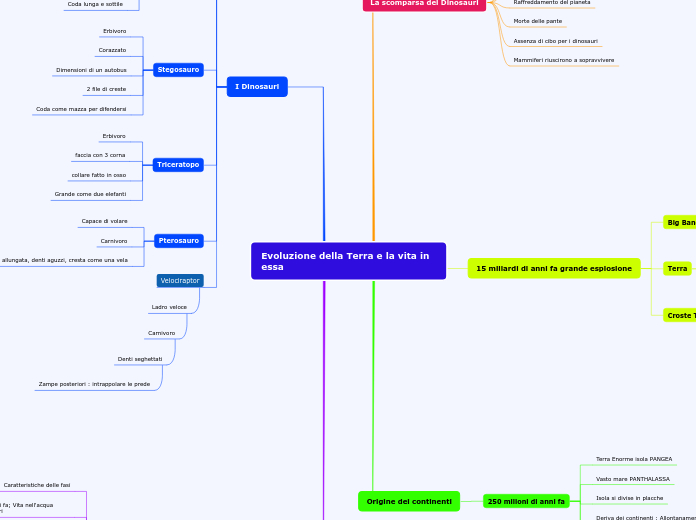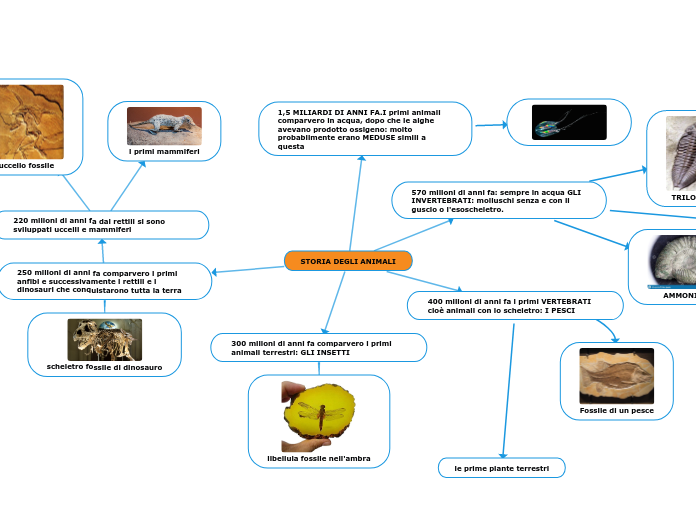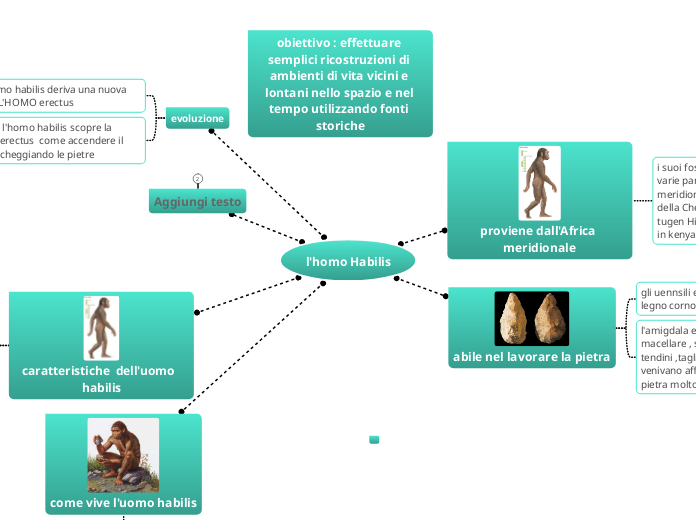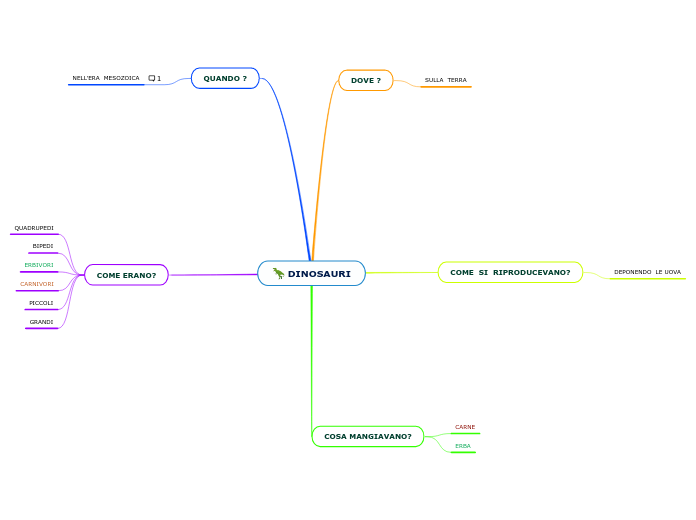Evoluzione della Terra e la vita in essa
In linguistics, syntax is the set of rules, principles, and processes that govern the structure of sentences in a given language, usually including word order.
La vita sulla Terra
A compound sentence is a sentence that has at least two independent clauses joined by a comma, semicolon or conjunction. An independent clause is a clause that has a subject and verb and forms a complete thought.
Quaternaria
Terziaria
Secondaria
Primaria
Arcaica
4 fasi evolutive
Create your own compound sentences, using the coordinators above.
Quaternaria : 2 milioni di anni fa ad oggi; Era glaciale, mammiferi coperti di pelo si sviluppano ->MAMMUT, l'uomo domina la Terra
Terziaria : 65-2 milioni di anni fa; mammiferi e uccelli iniziano a diffondersi; Primati-> scimmia posizione eretta->Ominidi
Secondaria : 230-65 milioni di anni fa; Ragni, millepiedi e insetti, DINOSAURI
Primaria : 600-230 milioni di anni fa; Acqua->Trilobiti, pesci con lo scheletro, Terraferma->Anfibi
Arcaica : 5 miliardi-600 milioni di anni fa; Vita nell'acqua esseri viventi semplici -> Monocellulari
Caratteristiche delle fasi
I Dinosauri
A complex sentence is a sentence that contains an independent clause and one or more dependent clauses.
An independent clause can stand alone as a sentence, but a dependent clause even though it has a subject and a verb cannot stand alone.
Velociraptor
Ladro veloce
Denti seghettati
Zampe posteriori : intrappolare le prede
Pterosauro
Attributive clauses serve as an attribute to a noun (pronoun) in the main clause. This noun or pronoun is called the antecedent of the clause.
Testa allungata, denti aguzzi, cresta come una vela
Carnivoro
Capace di volare
Triceratopo
An adverbial clause is a group of two or more words that function as an adverb in a sentence.
Grande come due elefanti
collare fatto in osso
faccia con 3 corna
Stegosauro
An appositive clause follows another noun or noun phrase in apposition to it; that is, it provides information that further identifies or defines it.
Coda come mazza per difendersi
2 file di creste
Dimensioni di un autobus
Corazzato
Brontosauro
The subject clause is a dependent clause that acts as a subject.
Coda lunga e sottile
23 metri di lunghezza
Collo lungo
Erbivoro
Allosauro
A predicative clause may be introduced by conjunctions - that, whether, whether... or, as, as if, as though, because, lest, the way - or connectives.
The latter may be conjunctive pronouns - who, whoever, what, whatever, which - or conjunctive adverbs - where, wherever, when, whenever, how, why.
Coda robusta
Zampe anteriori artigli
Testa grossa corna sopra gli occhi
Carnivoro enorme
T-rex
The object clause is a phrase on which a verb performs an action. It falls at the end of a sentence, and is governed by a verb or a preposition.
zampe anteriori per afferrare la preda
Molto veloce
Grandi dimensioni, 4 metri di altezza e lungo 12 metri
Carnivoro, 60 denti
Origine dei continenti
250 milioni di anni fa
See the example below and try to create your own simple sentences.
Tim is the driver.
50 milioni di anni fa : Posizione dei continenti simile a quella attuale
Deriva dei continenti : Allontanamento delle due placche
Isola si divise in placche
Vasto mare PANTHALASSA
Terra Enorme isola PANGEA
15 miliardi di anni fa grande esplosione
Croste Terrestri
The attribute is defined as a quality or characteristic of a person, place or thing.
Piogge perenni -> Mari
Vulcani
Nubi ->Piogge per milioni di anni
Terra
The predicative is defined as an adjective or noun forming or contained in the predicate.
Its main trait is that it serves to express a property that is assigned to a 'subject'.
For e.g.: The dog is old.
Superficie si raffredda
Origine CROSTE TERRESTRI
Massa infuocata
Big Bang
Traditional grammar defines the object in a sentence as the entity that is acted upon by the subject.
Nascita del Sole e del sistema solare
The indirect object identifies the person/thing for whom/which the action of the verb is performed.
The indirect object is usually a person or a thing.
Nascita della Terra
Origine dell'Universo
The direct object is the receiver of the action mentioned in the sentence.
Nuvole di gas
La scomparsa dei Dinosauri
Mammiferi riuscirono a sopravvivere
Assenza di cibo per i dinosauri
Morte delle pante
Raffreddamento del pianeta
gas e polveri -> Sole oscurato
Meteorite -> Esplosione grave sulla Terra
65 milioni di anni fa









